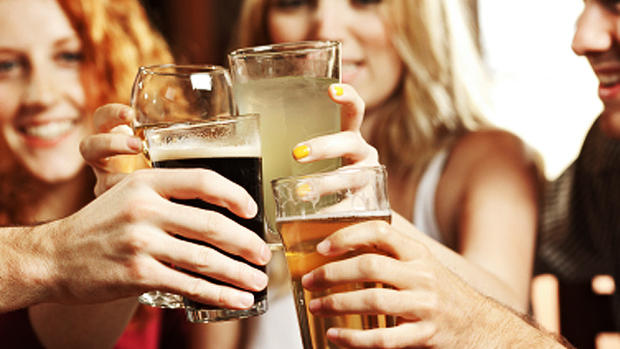Just tasting beer may make you want to drink more
Just tasting cold, refreshing beer -- with no influence from alcohol -- make increase your desire to get drunk.
A new study reveals that the taste of beer leads the brain to release a hormone called dopamine, which controls the reward and pleasure centers of the brain. Dopamine has been linked to drinking and other drug abuse.
"We believe this is the first experiment in humans to show that the taste of an alcoholic drink alone, without any intoxicating effect from the alcohol, can elicit this dopamine activity in the brain's reward centers," David A. Kareken, professor of neurology at the Indiana University School of Medicine and the deputy director of the Indiana Alcohol Research Center, said in a press release.
Forty-nine men who were about 25-years-old were scanned with positive electron tomography (PET) when they tasted beer and when they tasted Gatorade. None of the men had significant drug or tobacco use history, and they all said they liked beer over other alcoholic drinks.
Women were not included in the experiment because there weren't many women who said they preferred beer and met the study's other criteria.
Study participants were given 0.5 oz of their preferred beer over 15 minutes. This allowed them to taste the beer, but not increase their blood alcohol level above a detectable amount. They could not get intoxicated off of this amount.
There were significantly increased levels of dopamine on the beer scans compared to the Gatorade scans. Subjects said they craved more beer after tasting beer, while not many said they wanted to drink more Gatorade after drinking the sports drink. This was in spite of the fact that many participants said they preferred the taste of Gatorade.
Stronger effects were seen in participants who said they had close relatives who had a history of alcoholism, which may signify a genetic link for the disease.
- Moderate drinking may increase breast cancer survival rates
- "Hangover soup" Yak-a-mein actually works, scientist says
- Study shows Brits underreport alcohol consumption by up to 60 percent
Dai Stephens, a research professor in psychology at the University of Sussex, told the BBC that while the finding that taste can influence desire was not surprising because similar results were seen in animal studies, the family link was interesting. He was not involved in the study.
"(This) underlies the development of alcohol, and perhaps other drug abuse," Stephens said.
But other experts said it wasn't time to jump to conclusions about beer drinkers' risk for alcoholism.
"With regard to the family history effect, this is quite difficult to assess and know what it means so we can't be too sure of an effect or how strong it might be," Peter Anderson, a professor of substance use, policy and practice at Newcastle University, U.K., said in a statement to Live Science.
Dr. Scott Krakower, medical director of the Mineola Community Treatment Center in Mineola, N.Y., agreed with the study's findings. He suggested to HealthDay that physicians may want to look into any patients that are reporting increased drinking habits.
"It's one of the first pieces of research that tests whether the flavor of something affects behavior," he said to HealthDay. "People tell me they can't be around alcohol at all because it immediately triggers them to start drinking."
The study was published on April 15 in Neuropsychopharmacology.
